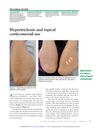 25 citations,
March 2017 in “Steroids”
25 citations,
March 2017 in “Steroids” Allopregnanolone increases growth and changes gene activity in human brain cancer cells.
 23 citations,
April 1999 in “The Journal of Clinical Endocrinology and Metabolism”
23 citations,
April 1999 in “The Journal of Clinical Endocrinology and Metabolism” All treatments reduce hair growth; low dose flutamide most effective with fewer side effects.
 20 citations,
August 1987 in “Journal of steroid biochemistry/Journal of Steroid Biochemistry”
20 citations,
August 1987 in “Journal of steroid biochemistry/Journal of Steroid Biochemistry” Aldactone was more effective in reducing hair growth in women with hirsutism than Diane, despite having less impact on hormone levels.
[object Object] 19 citations,
May 2022 in “International journal of molecular sciences” PRX01, PRX44, and PRX73 are essential for root hair growth in Arabidopsis thaliana.
 17 citations,
August 2002 in “Dermatologic Surgery”
17 citations,
August 2002 in “Dermatologic Surgery” Fluridil safely promotes hair growth in men with androgenetic alopecia.
 13 citations,
April 2020 in “Experimental Cell Research”
13 citations,
April 2020 in “Experimental Cell Research” PCAT1 helps hair growth by controlling miR-329/Wnt10b.
 13 citations,
September 2019 in “EBioMedicine”
13 citations,
September 2019 in “EBioMedicine” sPLA2-IIA increases growth in hair follicle stem cells and cancer cells, suggesting it could be targeted for hair growth and cancer treatment.
 12 citations,
June 2017 in “Cell Cycle”
12 citations,
June 2017 in “Cell Cycle” Minoxidil foam helps hair growth by increasing good proteins and decreasing bad pathways in men with hair loss.
 11 citations,
September 2020 in “OncoTargets and Therapy”
11 citations,
September 2020 in “OncoTargets and Therapy” Dihydrotestosterone increases growth and spread of human brain cancer cells, and blocking its formation might help treat this cancer.
9 citations,
July 2021 in “Frontiers in genetics” Melatonin makes cashmere grow earlier and more by increasing certain gene activity in goats.
8 citations,
January 2016 in “Cells tissues organs” Norepinephrine helps skin cells grow, which is important for hair growth.
 7 citations,
January 2019 in “Pharmaceutical Biology”
7 citations,
January 2019 in “Pharmaceutical Biology” Eclipta prostrata helps hair growth and maintains the growth phase by affecting certain growth factors.
 7 citations,
January 2014 in “Case reports in endocrinology”
7 citations,
January 2014 in “Case reports in endocrinology” A woman's excessive hair growth was caused by a rare benign tumor in her adrenal gland, which was successfully removed.
 7 citations,
April 2013 in “Journal of Cellular Biochemistry”
7 citations,
April 2013 in “Journal of Cellular Biochemistry” CD61 is important for mouse tooth cell growth and works through Lgr5.
 7 citations,
January 2003 in “Elsevier eBooks”
7 citations,
January 2003 in “Elsevier eBooks” Testosterone is crucial for development, growth, and various body functions in mammals.
 5 citations,
September 2021 in “Frontiers in Cell and Developmental Biology”
5 citations,
September 2021 in “Frontiers in Cell and Developmental Biology” Dihydrotestosterone treatment on 2D and 3D-cultured skin cells slows down hair growth by affecting certain genes and could be a potential target for hair loss treatment.
 5 citations,
June 2015 in “Journal of Investigative Dermatology”
5 citations,
June 2015 in “Journal of Investigative Dermatology” Feathers are useful for researching growth, regeneration, and the effects of treatments like chemotherapy on hair loss.
[object Object]  4 citations,
February 2022 in “International Journal of Cosmetic Science”
4 citations,
February 2022 in “International Journal of Cosmetic Science” Watercress extract helps increase hair growth and thickness by blocking hair loss factors.
 3 citations,
August 1986 in “BMJ. British medical journal”
3 citations,
August 1986 in “BMJ. British medical journal” Women with excessive hair growth often have hormonal issues and need medical advice and treatment.
 2 citations,
October 2015 in “Obstetrics and gynaecology cases - reviews”
2 citations,
October 2015 in “Obstetrics and gynaecology cases - reviews” Removing both ovaries may better treat increased male hormone levels and related symptoms in postmenopausal women when hormone therapy doesn't work.
 2 citations,
September 2004 in “Fertility and sterility”
2 citations,
September 2004 in “Fertility and sterility” High androgen levels can cause excessive hair growth and may indicate serious health issues, including heart disease and fertility problems.
 1 citations,
September 2017 in “Journal of Investigative Dermatology”
1 citations,
September 2017 in “Journal of Investigative Dermatology” Blocking a specific enzyme can reduce the negative impact of stress hormones on hair growth cells.
 November 2024 in “Fermentation”
November 2024 in “Fermentation” Fermented ginsenosides from kimchi bacteria may promote hair growth better than finasteride.
 October 2024 in “Journal of Plant Growth Regulation”
October 2024 in “Journal of Plant Growth Regulation” Fusarium sp. strain K-23 helps Arabidopsis plants grow better in salty soil by promoting root hair growth.
 July 2024 in “Clinical Cosmetic and Investigational Dermatology”
July 2024 in “Clinical Cosmetic and Investigational Dermatology” Exosomes can help promote hair growth and may treat hair loss.
 April 2024 in “Biomedicine & pharmacotherapy”
April 2024 in “Biomedicine & pharmacotherapy” Pilose antler extract helps hair grow in mice with a type of hair loss by speeding up the growth phase.
 February 2024 in “Molecules/Molecules online/Molecules annual”
February 2024 in “Molecules/Molecules online/Molecules annual” NMN could potentially treat hair loss by reducing oxidative stress and improving cell health.
 September 2023 in “bioRxiv (Cold Spring Harbor Laboratory)”
September 2023 in “bioRxiv (Cold Spring Harbor Laboratory)” FOL-026 peptide can help repair blood vessels and promote growth, offering potential treatment for vascular diseases.
 July 2023 in “Frontiers in Veterinary Science”
July 2023 in “Frontiers in Veterinary Science” Melatonin helps hair grow by activating the RORα receptor in goats.
 February 2022 in “Cleveland Clinic Journal of Medicine”
February 2022 in “Cleveland Clinic Journal of Medicine” Prolonged use of topical corticosteroids can cause excessive hair growth.



























